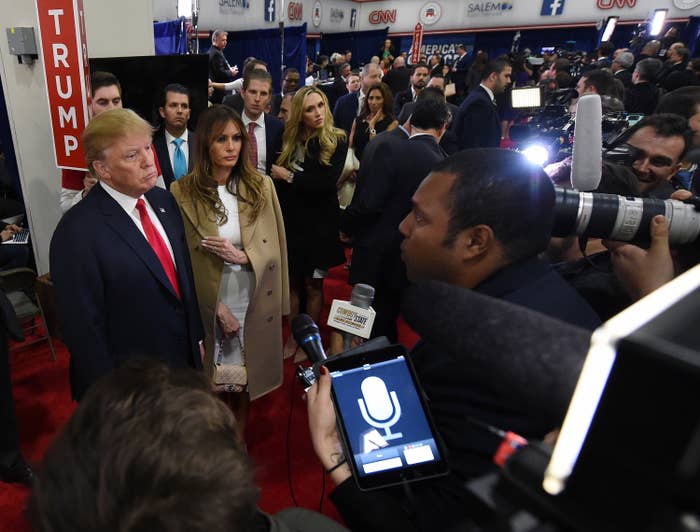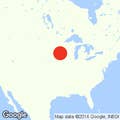
The American political media notoriously packs this Iowa city every four years, driving mid-tier hotel room rates past $600 and making it impossible to get a reservation at Lucca on a Sunday night.
This year, we in the media are debating what exactly is going on out there down the long roads out from the state capital, and here is the question confusing us: What kind of a phenomenon is Donald Trump?
“I can't help but wonder if his Twitter account is more effective at this point than a TV ad,” mused CNN’s senior media correspondent, Brian Stelter, Sunday.
Here’s the question: Is Trump the last great television showman, revenge of a dying medium on the next generation? Or is he the thick-fingered, 69-year-old avatar of something entirely new, a politics driven by Twitter trolling and your Florida uncle’s Facebook page, and operating outside the traditional guardrails of American politics?
The results of the Twitter poll on this question are in. And it appears, inevitably, that the answer is: both.
The rise of Trump points to something that those of us who have spent a long time fighting about the relative importance of TV and new media to politics didn’t quite anticipate: That rather than being at war with one another, the new medium and the old are locked in an awkward embrace.
A few years ago, we spent our time tweeting about what we saw on cable news. Now much of cable news amounts to reading Twitter aloud. Trump dominates and serves television, and he uses social media to program it.
This is not to say that 2016 hasn’t offered glimpses of post-television politics. I began this presidential campaign cycle with a essay about how Facebook would dominate it, and I could claim vindication in Bernie Sanders’ campaign. He has harnessed the Senate’s biggest Facebook page into a movement that has given him a lot more money and energy than his profile would suggest. Bill Bradley would have had more juice if he had had Facebook.
But Sanders can't quite seem to run away even with Iowa, which rejected Hillary Clinton soundly in 2008. She of the wooden tweets has hardly been swept aside by the new media forces.
Trump, meanwhile, offers strong evidence for the enduring power of television.
Trump is obsessed with TV. His failed 1980s fantasy project on Manhattan’s West Side was to be called Television City. He owes his national fame to The Apprentice.
“He is TV,” said Robert Costa, a Washington Post reporter who has covered Trump closely, and who I grabbed on his way out of a Des Moines coffee shop. He noted that he sometimes calls out camera angles from the stage, and occasionally uses the word “ratings” to mean “polls.”
Trump campaigns like a television producer, a veteran television producer noted with some admiration to me this weekend.
“As a video guy — everything you look for, he has it,” said the producer. “That staging, that flash, and he says 10 new things every day.”
These are the old TV values, and there’s little doubt at Trump’s strength in that old world. But Trump is a particularly good fit for the new world of TV, one that shapes itself in relation to the digital conversation.
TV, noted another cable news veteran, is in the process of trying to find distribution on Facebook, Snapchat, and Twitter.
“That means creating content optimized for social — which means less substantive stuff, and perfect for Trump,” he said. “This whole cycle is social media driving TV and vice versa.”
Trump is also much discussed on Facebook, and he tweets a lot; he has an as yet unused Snapchat account. But the extent to which the television networks have served Trump’s rise is a source of some embarrassment for their staffs. CNN President Jeff Zucker, who helped create The Apprentice at NBC and has seen Trump drive healthy ratings, has beaten back internal complaints about Trump’s place on the network.
Here on the ground in Des Moines, however, there are signs that the media is reconciling itself to handling the would-be strongman — whose dark talk about Muslims in America Hillary Clinton called “shameful” and “dangerous” in her closing speech Sunday night — like another member of the club.
Sunday, Trump offered warm, personal greetings to John Heilemann and Mark Halperin, the Bloomberg Politics chiefs and quasi-official faces of American political media — "Mark and John, their families are here. Great people," he told his crowd in Sioux City.
(The rest of the political press has directed a mix of puzzlement and rancor at Heilemann and Halperin, who are also the authors of Game Change. The hot press rumor this strange season is that the two have planted secret microphones around town in service of their Showtime documentary. A cross-section of Washington media types whispered about it at a party the two men co-hosted Sunday morning, and Heilemann told me with some frustration that the rumors are both “ridiculous” and “unequivocally false." "We are not recording anyone surreptitiously," he said.)
Their party, the Iowa Caucus Snowflake Garden Brunch, was held in a fancy old Des Moines building called the World Food Prize Hall of Laureates. The whole club — the American political-media elite — were there. And among their number were the Trump sons, Eric and Don, passing out business cards embossed in gold with the logo of their employer, the Trump Organization.
The young men were, by all accounts, very civilized, and welcomed into Washington’s transplanted society. They found common ground in discussing the Trumps' role in bringing the chef Laurent Tourondel’s restaurant, BLT Prime, to the District; the bistro took a place in the Trump International Hotel after an earlier chief decamped over Trump’s xenophobic remarks.
The Trump sons seemed particularly interested in meeting television producers.

